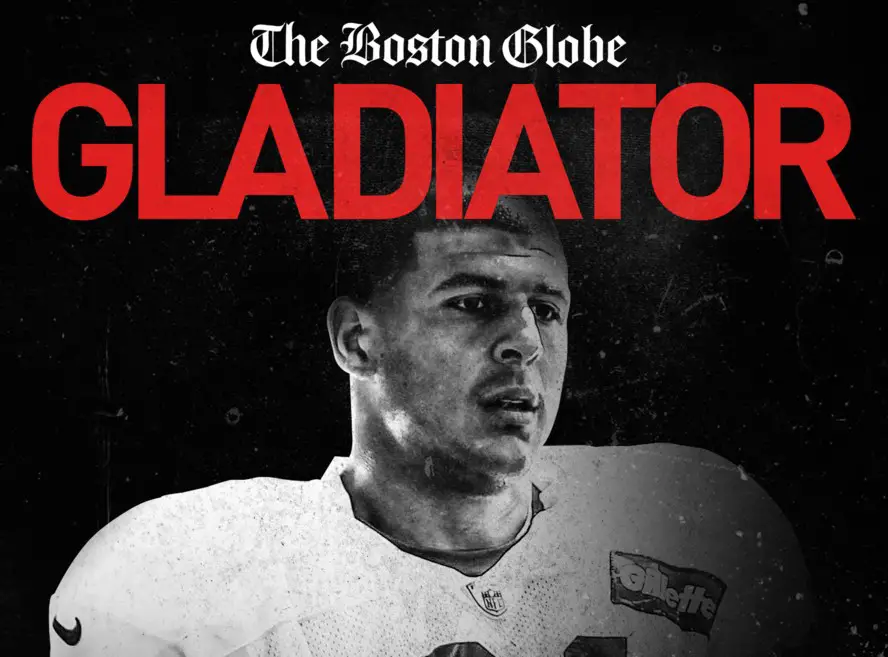“If it is to be, it is up to me.”
These were the words Aaron Hernandez lived by until he tragically took his own life while serving a life sentence for the first-degree murder of Odell Lloyd. Lloyd was the husband of Hernandez’s fiancé’s sister, which only adds to the complexity of the football star’s tragic fall.
His skills as a receiver and a runner at the tight-end position made Hernandez a versatile talent. It did not take very long for Hernandez to blow up after entering the league; in his second season, he and Rob Gronkowski were statistically the best tandem of TEs in NFL history, and Hernandez finished the season with close to 1,000 yards gained from scrimmage. The impressive performance of the tight-end persuaded the New England Patriots to give him a $41 million contract with a $12.5 million signing bonus at the age of 22. But after the following season, Hernandez was arrested.
To explore Hernandez’s jarring fall from grace, The Boston Globe and podcast team Wondery joined forces to create “Gladiator: Aaron Hernandez and Football Inc.” They establish in Episode 1 of the six-part podcast that the goal is to find answers for “a man who spiraled out of control while elite coaches and others in the football business looked the other way.” Wondery has produced several highly praised podcasts that follow a similar structure, such as “Dr. Death” and a collaboration with The Los Angeles Times called “Dirty John.”
The Spotlight investigative team, an elite group within The Boston Globe, is best known for their uncovering of systemic child sex-abuse scandals within the Catholic Church. In 2015, the team’s heroic acts of journalism were portrayed on the big-screen in the Academy Award-winning film “Spotlight.”
Reporter Bob Hohler takes the lead on a few of the podcast’s episodes and functions as the host of the production. There are several other members of the Spotlight team who also contribute their experiences and findings to the project. Together, the team is able to create a detailed timeline from Hernandez’s adolescence, all the way to the presentation of scientific research performed on his brain at Boston University following his suicide.
A characteristic of the podcast that livens up its experience is the use of a variety of well-layered background instrumentals and sound effects. For instance, in Episode 1 there is an excerpt of an interview with the mother of Lloyd, and Wondery intensifies the emotional reaction with gentle synths and piano keys that evolve as the speaker grows increasingly stirred. There is rich background music scattered across all the episodes, giving it a potent theatrical feel. The production team also exploits sound effects to vividly recreate the environment of a high school football game, a bouncing dance club and several other environments.
“Gladiator” uses varying sources, ranging from face to-face-interviews, text messages and phone calls, to police records and TV broadcasts. Their ability to condense such a wide web of information into a cohesive reflection is astounding. There is not a moment in the podcast where the subject matter feels stagnant. Because there are so many aspects of Hernandez’s situation to speculate on, “Gladiator” is swift-paced and remains enticing throughout.
The wide range of differing perspectives “Gladiator” incorporates is another factor that enhances the podcast’s overall success. Each event the Spotlight team covers in the series is accompanied by accounts from sources such as first-responding officers, Hernandez’s brother, former teammates, lawyers, prosecutors, scouts and his victims’ loved ones. A defining strength of the podcast is its ability to capture the full scope of a situation by making sure all perspectives of the situation are accounted for without bias or favoritism. The team is focused on finding the facts and basing their judgments strictly on indisputable evidence.
In Episode 4, a woman provides a unique perspective on Hernandez’s personality following fame. She claimed he was easily persuaded by his group of friends — who were commonly understood as nothing but “trouble.” She provides insight into the way Hernandez was influenced by these friends to experiment with drugs. This source was extremely valuable, as she was one of only a few women to speak on the case while also being the only female to speak about him in a personal context. As a woman, she was able to speak to parts of Hernandez’s character that men may not be able to detect as easily.
Another rich source of evidence the Spotlight team explores in their podcast is the people from Bristol in Episode 2. The reporters were able to receive interviews from one of Hernandez’s high school coaches, his high school quarterback and his strongly bonded brother, Jonathan. Each member of the community was able to give their own unique insight into Hernandez’s journey to NFL stardom. His brother shed light on the abuse the two faced from their strict father, high school QB Dennis Sansoucie provided a glimpse into the social life Hernandez enjoyed and his coach was able to give a description of his progression as a player through the years.
The Spotlight team also gained access to the 300 phone calls Hernandez made from jail while awaiting trial. The inclusion of these recordings presents a profound observation on the football star at his most vulnerable. “Gladiator” holds nothing back and includes some of the most personal and difficult conversations Hernandez had with his mother, friends, former NFL teammates and his agent. The pain and remorse in his voice is moving and gives the podcast’s audience a first-hand account into his ruptured mind.
Episode 6 wraps up the production well by commenting on the aftermath of Hernandez’s suicide. The creators also profess what they feel is the most influential factor in Hernandez’s case: the head trauma he sustained throughout his life in football. The inclusion of recordings from the presentation on scientific research done on Hernandez’s brain by Dr. Anne McKee is very persuasive; it not only forced the NFL to acknowledge the danger of the sport, but caused parents to seriously question whether or not they should allow their kids to play tackle football.
However, there is still no black-and-white answer as to what exactly caused Hernandez to act the way he did. The podcast has several streams of evidence posing the blame on his abusive upbringing, bad group of hometown friends and lack of support from his agent and coaches. However, “Gladiator” doesn’t tell you what to believe and leaves the pieces to the puzzle for listeners to piece together and interpret on their own. The podcast will be streaming its last episode on Nov. 20, and members of the Spotlight team will field questions from the public on their investigation. Listen to the podcast yourself and make your own opinion on what caused the tragedy.
















